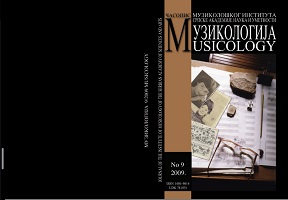„Tамо горе маглита планина“: етномузиколошко-филолошки прилог о једној песми из копаоничког краја
“Up There Is A Foggy Mountain”: An Ethnomusicological-Filological Contribution on a Traditional Song from the Kopaonik Region
Author(s): Jelena Jovanović, Prvoslav T. RadićSubject(s): Customs / Folklore, Music, Cultural Anthropology / Ethnology, Philology, Sociology of Art
Published by: Muzikološki institut SANU
Keywords: narrative poem; ballad; celebration song; Kopaonik; Kosovo-Resava dialect; Serbian Dinaric vocal tradition; decorative j; chorus break; silver pipes; Radula and Janja; the central Balkans;
Summary/Abstract: A comparative ethnomusicological and philological analysis was made of the narrative song (ballad) field recording Tamo gore maglita planina, from the village of Mrča, Kopaonik mountain region, South Serbia. The song was sung by Sultana Savić (b. in 1903) whose birthplace is the nearby village of Štava. Philological analysis revealed that the features of the song’s language belong primarily to the Kosovo-Resava dialect type, with occasional influences from Prizren-Timok speech. The song’s content shows its connection to old Balkan beliefs, partly personified by the shepherd mythological couple of Radoje (Vlašić Radule) and Janja. Ethnomusicological analysis provides numerous arguments (rudimentary monothematic form, refrain pause, tone row consisting of trichord, repetitiveness) to support the assumption that the song is a part of the archaic Balkan, Serbian and South Slavic ritual vocal tradition, formed, most probably, under the predominant influence of Dinaric rural vocal culture. These findings are also complementary to Jovan Cvijić’s anthropogeographical remarks about the region where the song originates from.
Journal: Muzikologija
- Issue Year: 1/2009
- Issue No: 9
- Page Range: 153-164
- Page Count: 12
- Language: Serbian

